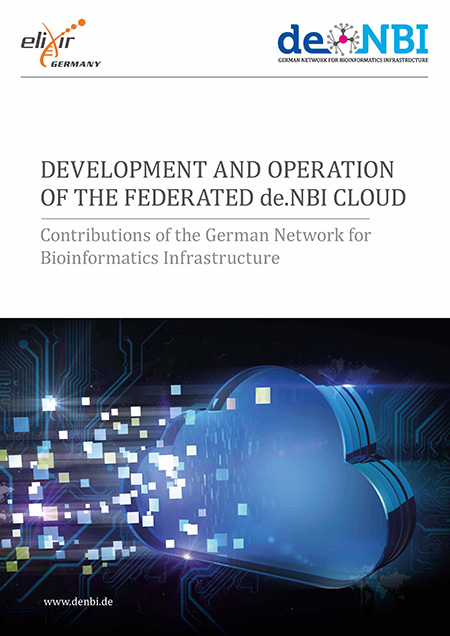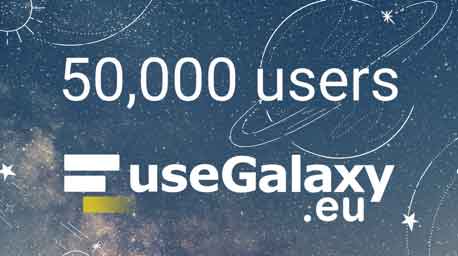
| Issue 03/2022 | |||||||||||||||||||||
3rd Annual Meeting of the de.NBI Industrial Forum in November 2022 |
|||||||||||||||||||||
|
This year, the 3rd annual meeting of the de.NBI Industrial Forum will take place in a virtual format on 24 November 2022. As a key topic the meeting will present contributions from the field "Digital Health". Further, it is planned to present the collaboration with the European organization ELIXIR. The agenda as well as the registration of the third annual meeting will be available soon and can be found at https://www.denbi.de/industrial-forum/industrial-forum-activities. Save the date! |
|||||||||||||||||||||
|
|||||||||||||||||||||
|
In March 2022, the Community of Practice (CoP) for data management (DM) and stewardship (DS) training in the life sciences - Developing training and sharing knowledge, best practices, and standards - started with a kick-off meeting hosted by ELIXIR-DE. The essential vision was to bring national and local DM/DS life science communities together to foster the exchange of training materials and knowledge among trainers. |
|||||||||||||||||||||
|
|||||||||||||||||||||
|
ELIXIR Communities bring together experts across Europe to develop standards, services and training within specific life science domains. To coordinate Single-Cell Omics research in Europe and beyond, ELIXIR has recently established the new Single Cell Omics Community, which has been approved by the HoN committee in May 2022. Single-cell technologies have undergone rapid developments in recent years and have revolutionized the way and the level of resolution by which life science research is conducted. The outline of the community´s activities is described in their white paper "Community-driven ELIXIR activities in single-cell omics". Naveed Ishaque (ELIXIR-DE) has been appointed as a co-lead for the ELIXIR Single Cell Omics Community. He recently started his own research group with research focus on applying computational approaches to understand the basis of molecular biological heterogeneity in data of human disease within the unit of Roland Eils at the Berlin Institute of Health. Find more information on Naveed Ishaque‘s research here. |
|||||||||||||||||||||
|
|||||||||||||||||||||
|
We wish Bérénice every success in further developing the Marine Metagenomics Community! |
|||||||||||||||||||||
|
|||||||||||||||||||||
|
Team of ELIXIR-DE Officers is growing
|
|||||||||||||||||||||
|
|||||||||||||||||||||

We are delighted to present our new de.NBI brochure entitled “Development and operation of the federated de.NBI Cloud“. With the life sciences becoming increasingly data-driven, cloud technology will become more important to the sector. Following this trend, the present booklet showcases the power, strength, and range of the de.NBI Cloud for the life science community by providing the ability to unlock research data and better collaborate across the ecosystem. Furthermore, it also sheds light on the role of the de.NBI Cloud in national and international projects such as NFDI, DeCOI, GHGA or EOSC-Life in the European sector of computational biosciences. The editorial team would like to thank all involved authors. We wish you lots of pleasure reading the de.NBI Cloud brochure. |
|||||||||||||||||||||
|
|||||||||||||||||||||
|
At present, the de.NBI Cloud has 2100 registered users and 450 active projects. Two new testimonials on the cloud web page showcase the use of de.NBI cloud resources for plant breeding driven by big data analysis and computational solutions from data science and machine learning to solve biomedical problems. |
|||||||||||||||||||||
|
|||||||||||||||||||||
|
Numerous de.NBI services have been improved in the last quarter:
|
|||||||||||||||||||||
|
|||||||||||||||||||||
|
|||||||||||||||||||||
|
|||||||||||||||||||||
|
The next de.NBI training events are announced on www.denbi.de/training.
Next scheduled events:
|
|||||||||||||||||||||
Impressum |
|||||||||||||||||||||
|
Responsible for Contents
A. Tauch, T. Dammann-Kalinowski
de.NBI - German Network for Bioinformatics Infrastructure c/o Forschungszentrum Juelich GmbH - IBG-5 Branch Office at Bielefeld University, 33594 Bielefeld, Germany Phone: +49-(0)521-106-8758
Fax: +49-(0)521-106-89046 Email: Web:https://www.denbi.de
Twitter: #denbi, @denbiOffice LinkedIn: https://www.linkedin.com/company/de-nbi For questions and remarks please contact Subscription
If you are interested in receiving regular updates on de.NBI - German Network of Bioinformatics Infrastructure, please subscribe to the de.NBI Quarterly Newsletter here. The mailing list will exclusively be used to distribute the de.NBI Quarterly Newsletter.
The de.NBI Quarterly Newsletter is a service of de.NBI - German Network for Bioinformatics Infrastructure for members, partners and interested public. All photos are copyright of the de.NBI administration office unless marked otherwise.To unsubscribe from the de.NBI Quarterly Newsletter, please use the unsubscribe link. |


 The de.NBI Industrial Forum has been established in 2018 and currently comprises 36 companies. The Industrial Forum connects the members of the forum with the de.NBI network by providing access to a collection of service tools, training courses and compute facilities. After an initial kick-off meeting in 2019, the Industrial Forum organizes annual meetings as the key activity. The first one took place in 2020 focusing on the Corona pandemic and on plant breeding. In 2021, the focus of the annual meeting was on the use of artificial intelligence (AI) in companies. In addition, the national projects NFDI4Biodiversity and NFDI4Microbiota had the opportunity to present their goals.
The de.NBI Industrial Forum has been established in 2018 and currently comprises 36 companies. The Industrial Forum connects the members of the forum with the de.NBI network by providing access to a collection of service tools, training courses and compute facilities. After an initial kick-off meeting in 2019, the Industrial Forum organizes annual meetings as the key activity. The first one took place in 2020 focusing on the Corona pandemic and on plant breeding. In 2021, the focus of the annual meeting was on the use of artificial intelligence (AI) in companies. In addition, the national projects NFDI4Biodiversity and NFDI4Microbiota had the opportunity to present their goals. We welcome Simon Gene Gottlieb as an ELIXIR-DE Officer (representing CIBI), active since 1 March 2022. Simon is a profound software engineer with focus on C++ and Linux. He is working on his PhD at the Freie Universität Berlin in the Algorithmic Bioinformatics group focusing on efficient data structures like the bidirectional FMIndex for approximate string searches. Simon also brings special knowledge surrounding the tool framework for SeqAn and OpenMS. As an ELIXIR Officer, one of his goals is to implement CWL support for SeqAn and OpenMS based tools, making these available on the Galaxy platform. If you ever feel like talking about efficient search schemes, newest C++ updates or soccer playing robots, you are welcome to contact Simon.
We welcome Simon Gene Gottlieb as an ELIXIR-DE Officer (representing CIBI), active since 1 March 2022. Simon is a profound software engineer with focus on C++ and Linux. He is working on his PhD at the Freie Universität Berlin in the Algorithmic Bioinformatics group focusing on efficient data structures like the bidirectional FMIndex for approximate string searches. Simon also brings special knowledge surrounding the tool framework for SeqAn and OpenMS. As an ELIXIR Officer, one of his goals is to implement CWL support for SeqAn and OpenMS based tools, making these available on the Galaxy platform. If you ever feel like talking about efficient search schemes, newest C++ updates or soccer playing robots, you are welcome to contact Simon. 